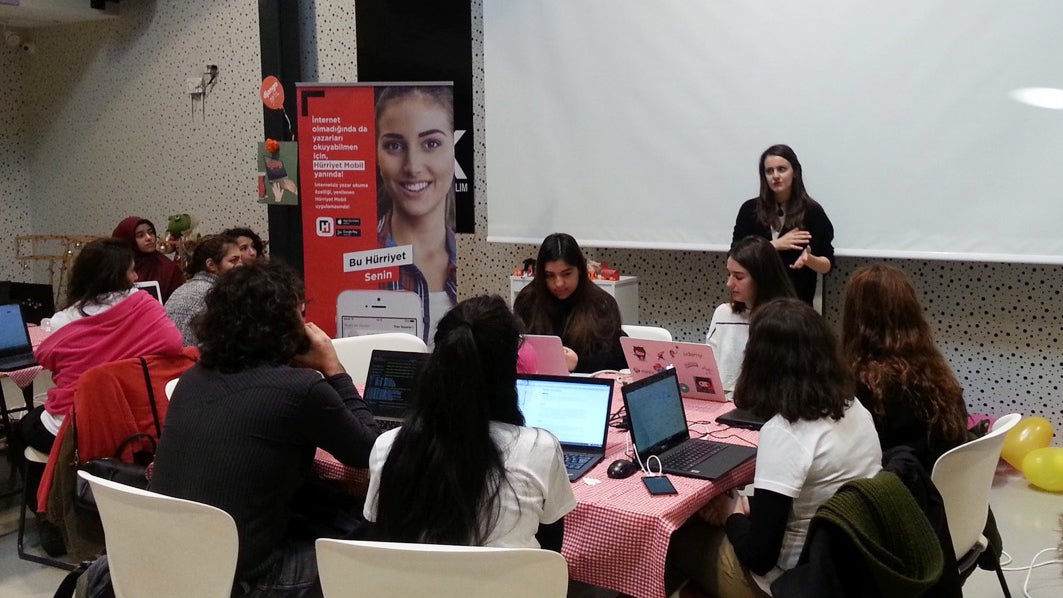
Texas GOP Lawmakers Propose Amending Abortion Ban Linked to Deaths and a Rise in Sepsis Cases
March 27, 2025
March Madness and babies: Are the sounds of the game too big for little ears?
March 27, 2025In the summer of 2013, Gülçin Yildirim, a database administrator, received an invitation for a meeting at an Istanbul chocolate shop with 11 other female coders. They were there to do something about the sexism they experienced in their workplaces. By the meeting’s end, they had formed a group that aimed to connect women in tech to fight gender-based discrimination and prejudice in the industry. One of the women, Elif Kuş, who had called for the meeting, suggested the group be named Kadin Yazilimci — or women coders — because when they searched the Turkish term on Google, nothing came up.
“I registered the domain, so that if someone searched for the term in the future they would find us,” Kuş told Rest of World.
Kuş was running her own software company at the time. At work, she would hear male colleagues say women couldn’t become coders. In her previous jobs, she had seen that female coders were often expected to perform less technical tasks like cleaning up code, writing web services, and even taking notes at meetings.
“Turkish women in tech are assumed to have better handwriting than male colleagues. Basically, they’re considered secretaries,” Kuş, 47, said.
Turkish women who become software engineers generally expect a secure career that can vault them to a better position in society. Instead, they’ve found they are a mistreated and undervalued minority. In Turkey’s tech industry, less than a quarter of workers are women, according to various surveys — lower than the global average of 28%. Female IT engineers have complained about male-dominated workplaces, with 70% saying it negatively affected their careers, according to a 2018 report by consulting firm Deloitte Turkey and the Information Technology Industrialists Association.
At the same time, the government is pushing for women to prioritize their families over work. Turkish President Recep Tayyip Erdoğan has said that women should have at least three children. In 2021, Turkey withdrew from the Istanbul Convention, which prevents and fights violence against women.
If a cake needed to be cut in the office, they would immediately give the knife to me.
Rather than face the turbulent social conditions, many young IT professionals, particularly women, are choosing to leave the country, according to Füsun Sarp Nebil, a tech entrepreneur and CEO of the technology journalism website Turk Internet.
“The increasing pressure in recent years, the obstructions on social life, like the cancellation of concerts, the lack of freedom of expression, the environment of violence … disturbs young people and especially women,” Nebil told Rest of World.
“Salaries are at the bottom of the list of reasons for leaving Turkey,” she said.
Around 8,000 IT engineers left the country between 2019 and 2022, seeking better economic and career opportunities overseas, according to Cem Nuri Aldaş, the head of Turkey’s Chamber of Computer Engineers.

In this environment, Kadin Yazilimci is one of Turkey’s largest groups fighting for the rights of female IT engineers, with about 3,000 members on their Slack channel. Yildirim, Kuş, and their colleagues have traveled across Turkey, including far-flung Anatolian towns, to deliver lectures on coding. They have organized book clubs, attended conferences, and run workshops to educate companies about inequality.
The members trade stories at these events. In one 2022 workshop, an attendee mentioned a job interview where she was told she could only be hired for a lower-level data analyst position and not as a software developer, despite her skills. The interviewer asked the woman whether she had plans to get married.
Another participant recalled being asked about her partner’s career during her job interview. “He works at a cafe, so I laughed out loud. Did we need to date software developers if we wanted to become software developers?” she said.
We won’t become masculine figures, and we will defend ourselves as warm, empathetic, loving creatures in the workplace.
Gender bias in the tech sector has been well documented globally, and in Turkey, it is a reflection of broader socioeconomic trends. Only 31% of women were employed in 2023, compared to nearly two-thirds of men, according to the Turkish Statistical Institute. Just 20% of women in the country attended university; among graduates of science, technology, engineering, and math programs, only 34% were women. The country ranked 127th among 146 nations in gender equality, and 133rd in a recent World Economic Forum index that measures the economic participation of women in the workforce.
Once in the workplace, women tend to occupy the lower rungs, according to the Deloitte report. Of almost 500 female tech workers surveyed, only 14% were senior managers. Just 6% were in the C-suite.
Banuçiçek Gürcüoğlu, a data scientist at ZeroNorth, a Danish software company, left Turkey in 2021. Her first job out of college was at an artificial-intelligence consultancy in Istanbul. She was hired as a data scientist, but was asked to write web services. As the only female employee, she was also expected to lead the office’s social activities, Gürcüoğlu told Rest of World.
“If a cake needed to be cut in the office, they would immediately give the knife to me,” she recalled.
Gürcüoğlu, who is now 36, left the company after 10 months. She decided a startup was not a good environment for her, and took a job at General Electric.
“Big companies are bulkier, but are better for women,” she said. She then emigrated to Europe for better opportunities.

Turkey’s brain drain includes some of the founders of Kadin Yazilimci. Yildirim moved to Prague in 2017 to work as a staff database engineer at Xata.io. Kuş also moved to Prague in 2023, and is now a senior software engineer at a top tech company.
Even with the founders abroad, the group continues its work in Turkey. Through their workshops, Ceyda Düzgeç, 28, a cloud engineer, has learned to work as a coder without suppressing her feminine identity, she told Rest of World. She admires the group’s logo: a hand with polished nails typing on a keyboard.
“[The group] had this attitude of ‘We won’t become masculine figures, and we will defend ourselves as warm, empathetic, loving creatures in the workplace,’ and I loved that,” Düzgeç said.
Yeşim Başaran, another member, recalled that when she began her career in 1997, there were few female software developers in the industry. “Nobody spoke about this stuff and companies didn’t do anything about it,” she told Rest of World.
That is changing, in part due to the efforts of Kadin Yazilimci. The past decade has also seen a few corporate companies invest in some initiatives to support women in IT, such as Borusan Holding’s “Let’s Code, Girls” campaign in 2016. Vodafone Turkey has launched a one-year “Women in Technology” internship program.
Yildirim said Kadin Yazilimci alone cannot reach lawmakers or change the hiring policies of companies. “We can only reach workers,” which, too, is valuable as their network is powerful, she said.
“When female coders open their own companies, they come to our pool of coders to hire,” she said.
#Turkeys #brain #drain #female #coders
Thanks to the Team @ Rest of World – Source link & Great Job Kaya Genç





